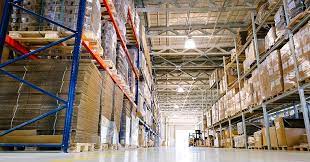
Warehousing: Growth’s on a solid foundation

NEW DELHI : The warehousing sector in India has been on a high growth trajectory in recent years. Its first major stimulus came through the introduction of the GST regime in 2017, which saw the sector growing from 35 million sq ft (MSF) during 2015-17 to 77 MSF over 2018-20. And since last year Covid-19 has been accelerating its rise as one of India’s sunrise sectors, with analysts expecting leasing activity to touch new highs as the pandemic reinforces the need for a robust supply chain.
Real estate consultancy CBRE has projected that warehouse leasing, which reached a historic peak of 32 MSF in 2019, will touch nearly 100 MSF in the next three years. Its Chairman (India, South-East Asia, Middle East and Africa) Anshuman Magazine points out that even before Covid-19, global manufacturing was witnessing a visible shift towards alternative hubs. Thanks to improved domestic capabilities in recent years, India has increasingly become an active player in the global manufacturing supply chain, he says. This has been supported by government initiatives such as Make in India, Aatmanirbhar Bharat and the PLI scheme. “As a result, demand in the industrial and warehousing (I&W) sector has surged, making it one of the key growth drivers of the real estate industry,” he says.
Another factor driving the warehousing story is the exponential growth in e-commerce and online shopping, which has propelled businesses to ramp up supply and storage to improve delivery. This phenomenon has got a further boost from Covid-19. A study earlier this year by consulting firm Praxis Global Alliance said that while in pre-Covid times (FY2018-2020), Grade-A and B warehouses in India grew at 18% CAGR, e-commerce and retail are expected to push growth of Grade-A and B warehouses at a much faster pace over FY2018-2025.
Abhijit Verma, CEO of the Avigna Group, a warehousing player in south India, says the warehousing landscape has undergone a dramatic transformation in a span of 12 months, with penetration into tier II and III cities witnessing a spurt. “In the south, cities like Madurai, Hosur, Nellore and Coimbatore will gain the maximum traction due to their location. In the north, Ludhiana, Lucknow, Jaipur, Farukkhnagar, Indore and Patna hold the same advantage as do Siliguri and Guwahati in the east,” he says.
Abhik Mitra, MD of Spoton Logistics, a Bangalore-based company, says investment by companies in logistics parks has gained pace of late in Chennai, which is fast emerging as a strategic warehousing location. Regions like Gujarat are also witnessing huge investment, besides Noida and Mumbai. “Official policies like the establishment of logistics parks and free trade warehouse zones are expected to spur market growth in the coming years. Emergence of 3PL and supergrid logistics is another factor that will fuel growth,” he says.
At the same time, Avigna Group’s Verma points out that the sector is still at a nascent stage, with the availability of skilled manpower being a challenge, especially as growing automation has led to a two-fold increase in demand for skilled workers. “Yet we are confident that, like in other sectors where India adapted fast after entering late, Indian warehousing will catch up to world standards in the next 2-3 years,” he asserts.
Source : Financial Express


